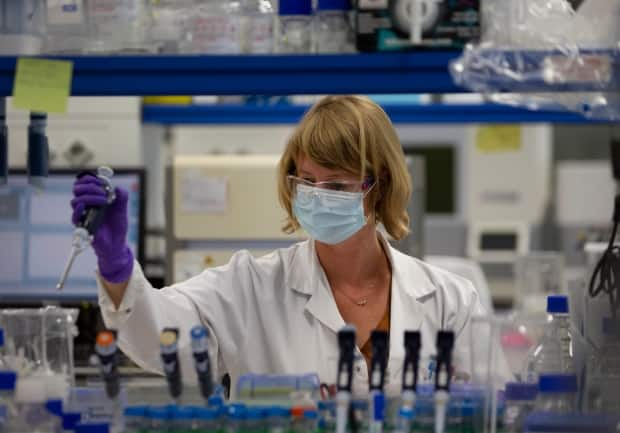B.C. health researchers call for better data in a post-pandemic world

Researchers in British Columbia say the pandemic has exposed weaknesses in how governments across Canada and around the world collect and use data to manage public health.
B.C.'s Deputy Provincial Health Officer Dr. Reka Gustafson gave a talk Friday morning titled, "Where to go next: How the current pandemic has informed future public health research priorities."
Gustafson says there's room for improvement to better understand COVID-19 but also how measures to curb the spread of the virus have affected health outcomes overall.
"From a public health perspective, a more important and interesting area of research for me is understanding how we responded to this as a society and learning from that," Gustafson said in an interview with CBC News earlier in the week, ahead of her talk.
Criticism for lack of data
On the same day as her talk, Gustafson came under fire when a leaked report showed the province has been collecting data that reporters and analysts have requested for months, but not sharing it with the public.
Many in B.C. have routinely criticized health officials for providing scant COVID-19 data compared to other provinces, thereby hampering more detailed analysis that could lead to better prevention.
But researcher Mohsen Sadatsafavi, a quantitative epidemiologist at the respiratory evaluation sciences program at the University of British Columbia, says the lack of health data collected and shared isn't unique to B.C.
"I think we could have done a much, much better job in data acquisition integration in earlier phases of the pandemic," Sadatsafavi said.
"We should learn from these lessons and be more prepared for, not just necessarily the next pandemic, but generally for the way we are tackling health problems through research."
Examples of success
Sadatsafavi says most governments don't collect enough data to begin with, or can't find a way to share data across departments, jurisdictions, and local or international borders.
The few countries that have been more data savvy, Sadatsafavi says, have had better success managing the pandemic.
He says South Korea, which has one of the lowest infection rates in the world, successfully analyzed anonymized data from sources like cellphone towers and credit card transactions to effectively combat the virus.
Given the millions of infections and deaths around the world, Sadatsafavi says, it could be possible to use artificial intelligence to determine who is more likely to get seriously ill or die from the virus.
'Factors that are out of our control'
Gustafson admits that the data available through the data dashboard offered by the B.C. Centre for Disease Control, where she also works as the vice-president of public health and wellness, is basic and without context.
"I wish I could change just about every aspect of it," she told the audience during her talk.
Although Gustafson is quick to point out achievements from the past year — from understanding the basics of how COVID-19 is transmitted to developing vaccines — she says there's still a lot to know.
"We haven't paid as much attention to the factors that are out of our control," she said, like the weather or social structures.
'What gets measured gets treasured'
While there is already a wealth of research around the social determinants of health, like housing and family composition, Gustafson says there isn't much concrete data related to it that has been consistently measured during the pandemic and shared on the same scale as daily case counts.
"What gets measured gets treasured," she said.
Gustafson stuck to the province's regular refrain on why this data has not been collected: a lack of time and resources, as well as concerns about privacy.
"I think the most important outcome of [the pandemic] is for us to build up the infrastructure to support what we call democratization of data," she said.
Disproportionate outcomes
Public health researcher Dr. Farah Shroff, a professor with UBC's School of Population and Public Health, agrees.
Shroff says the hyper-focus on COVID-19 has come to the detriment of studying the health impact of social determinants of health, many of which have worsened in the past year.
"This has been a pandemic which has disproportionately affected everybody who isn't as powerful as they could be," she said, adding that women and children have been particularly affected.
The vast majority of research funding during the pandemic has gone toward treatment of COVID-19, Shroff says, instead of health promotion and prevention.
"Every grandma will say 'an ounce of prevention is worth a pound of cure,' and that's true in research," she said.

 Yahoo Movies
Yahoo Movies 